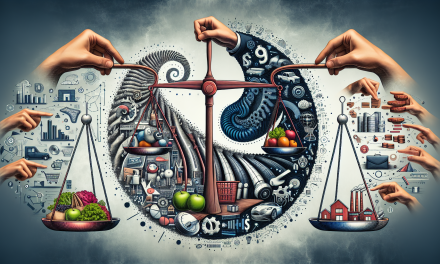Table of Contents
- Introduction
- The Importance of Logistics and Supply Chain Management
- Key Components of Logistics and Supply Chain Management
- The Role of Technology in Modern Supply Chains
- Sustainable Practices in Supply Chain Management
- Best Practices for Effective Logistics Management
- Frequently Asked Questions
- Conclusion
Introduction
Logistics and supply chain management has emerged as a critical area for businesses aiming to thrive in the contemporary market landscape. Many industries rely on effective logistics and streamlined processes to meet customer demands while maximizing profitability.
The Importance of Logistics and Supply Chain Management
Understanding logistics and supply chain management is essential for anyone involved in a business. The flow of goods and services extends beyond mere transportation; it encompasses an entire system that includes planning, implementing, and controlling the efficient flow of goods, services, and related information.
Moreover, improving logistics can significantly enhance customer satisfaction. For example, timely delivery of products can lead to increased customer loyalty. Thus, investing time and effort into understanding this domain can directly influence a company’s bottom line.
Key Components of Logistics and Supply Chain Management
1. Planning
Effective logistics begins with careful planning. This phase includes determining the ideal supply chain strategy, calculating the necessary inventory levels, and creating logistics frameworks that will guide the operations.
2. Procurement
Understanding how to procure goods effectively establishes a solid foundation for logistics. It includes identifying and selecting suppliers that align with your business goals. Additionally, consider exploring best practices in sustainable procurement to ensure that every purchase supports ethical and ecological considerations.
3. Inventory Management
Proper inventory management minimizes waste, reduces costs, and ensures that products are available when needed. Balancing the right amount of stock without overcommitting resources significantly contributes to a company’s operational efficiency.
4. Transportation
The transportation of goods between manufacturers, warehouses, and retailers requires meticulous planning. Businesses need to choose the most efficient shipping methods while considering factors like cost, speed, and reliability.
5. Information Systems
Advanced information systems have revolutionized how logistics and supply chains function. They provide real-time data that assist in decision-making and enhance transparency across the supply chain.
The Role of Technology in Modern Supply Chains
Technology plays a vital role in logistics and supply chain management. The integration of various technological solutions can result in improved efficiency, reduced costs, and enhanced customer satisfaction. For instance, automated inventory tracking helps businesses maintain accurate stock levels, significantly reducing human errors.
Furthermore, utilizing forecasting tools allows businesses to predict demand and align their inventory accordingly. These technological solutions are invaluable for maintaining a competitive edge in the marketplace.
Sustainable Practices in Supply Chain Management
Today’s consumers increasingly demand ethical and sustainable practices from the brands they support. As a response, businesses have begun to integrate sustainability into their supply chain strategies. For insights, check out mastering effective global procurement and logistics management.
One vital aspect of sustainability involves reducing waste and optimizing resources. This approach not only addresses environmental concerns but also contributes to cost savings. Companies that embrace sustainable practices often experience enhanced reputations and customer loyalty, driving further success.
Best Practices for Effective Logistics Management
1. Continuous Improvement
Logistics management should revolve around a culture of continuous improvement. Regularly assess processes and seek ways to optimize operations. Implementing feedback loops and utilizing performance metrics can guide improvements.
2. Training and Development
Equipping your team with the necessary skills is crucial. Providing training on logistics best practices enhances employees’ capabilities and confidence. Consider exploring the Master Logistics & Supply Chain Management Training Course for a structured approach to developing essential skills.
3. Collaboration
Encouraging collaboration among different departments can lead to innovative solutions. Logistics does not function in isolation and requires the input of various stakeholders. Effective communication enhances overall workflow and facilitates smoother operations.
4. Leveraging Data Analytics
Data analytics provides invaluable insights into consumer behavior and operational efficiency. Making data-driven decisions can help businesses streamline processes and eliminate inefficiencies.
Frequently Asked Questions
What are logistics and supply chain management?
Logistics and supply chain management involves overseeing the flow of goods and services, including all processes that transform raw materials into final products. It encompasses planning, execution, and monitoring of supply chain activities.
Why is logistics management important?
Effective logistics management is crucial for minimizing costs, improving customer satisfaction, and optimizing operations. By ensuring products are delivered timely and efficiently, businesses can gain a competitive advantage.
What is the role of technology in supply chain management?
Technology plays a significant role in enhancing efficiency and accuracy within the supply chain. Automated systems streamline operations, while advanced analytical tools enable better decision-making.
Conclusion
In today’s competitive marketplace, mastering logistics and supply chain management stands as a cornerstone for business success. By understanding the key components and embracing innovative practices, companies can ensure that they meet customer demands while maintaining profitability. As the landscape continues to evolve, ongoing learning and adaptation remain vital to effective supply chain management. For further exploration of critical skills, check out essential skills in tendering, procurement, and negotiation as well as the secrets of supply chain management.





